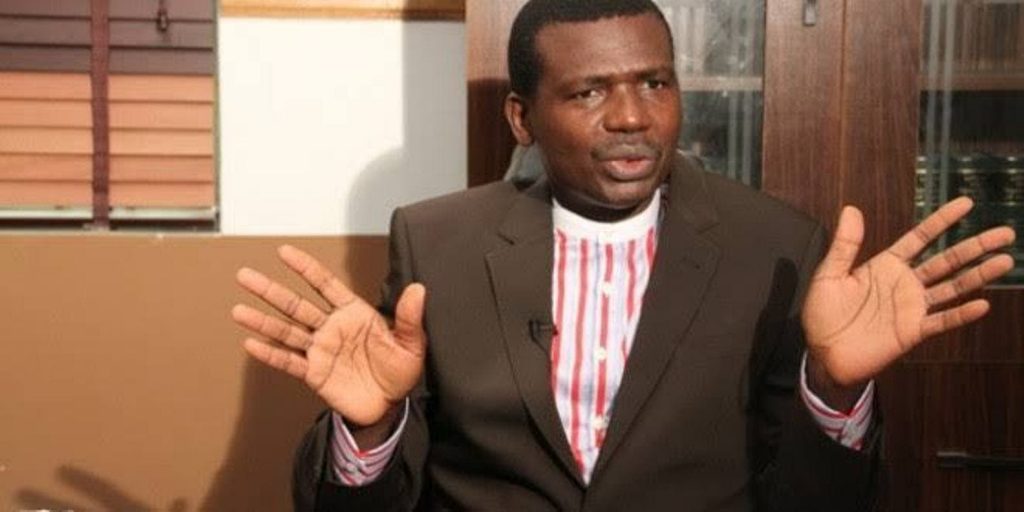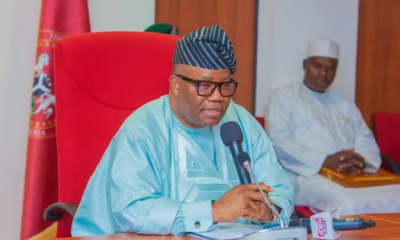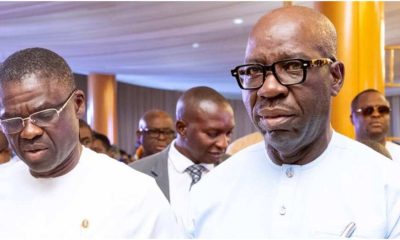Latest
Why I strongly disagreed with PEPT judgment—Adegboruwa
Published
8 months agoon

Eminent lawyer and rights activist, Ebun-Olu Adegboruwa, SAN, has said that “there are serious issues contained in the judgments” of the Presidential Election Petition Court “that would require further interpretation”.
Adegboruwa in Part 1 of an article entitled “The Crucial Verdicts”, made available to News Express on Tuesday, cited two of such judgement: the ones on testimony of witnesses and electronic transmission of results.
He wrote on testimony of witnesses: “I noticed that the Court disqualified some witnesses on subpoena based on the fact that they failed to frontload their witness statements on oath before the Court. In the first place, a subpoena is an order of the Court, commanding a witness to appear in court to give evidence or to tender a document. In some cases, these witnesses are government officials who ordinarily should not be within the reach of any of the parties. By issuing a subpoena, he is made to be a witness of the Court. In some other cases, they may be hostile witnesses who have been summoned by force to testify.
READ ALSO: PDP rejects National Assembly election tribunal judgement
“In any case at all, witnesses on subpoena should not be made to depose any statement on oath. It was the court that summoned the witnesses in the first place and they obeyed the order of the court to appear. In any event, subpoenas do not normally contain any directive for the witness to depose to any statement on oath. How then can the same court that commanded a witness to appear before it to testify turn around to disqualify the same witness, who is deemed to be a witness of the court? It just doesn’t add up.”
On electronic transmission of results, Adegboruwa wrote: “One of the contentious issues before the Court was that of electronic transmission of results by INEC. It was the contention of petitioners that had INEC followed its own guidelines for electronic transmission of election results real time, then there would have been no cases of manipulation or suppression of results. In this regard, the Court held that INEC is not under any obligation to electronically transmit election results. The Court relied upon the previous decisions of the Federal High Court and the Court of Appeal which it held were binding on the petitioners. First, this was a fresh election and the petition arising from it was between different parties and under totally different circumstances.
“The Court should have x-rayed the conduct of INEC in relation to the 2023 presidential election simpliciter, being the subject matter of the petition before it. INEC was not conducting the election of the Rotary Club but the 2023 presidential election in which over eighty million people were registered to vote and over N300B spent from the common purse.
READ ALSO:
“If INEC had through its own guidelines voluntarily madeTribunal orders election rerun in Banky W’s federal constituency a contract with the people of Nigeria, the Court should hold it bound by that undertaking and/or at least extract cogent reasons why it could not be done. A lot went into the 2022 Electoral Act, the high point of which was electronic transmission of results, which was meant to remove or reduce human intervention in the electoral process.
“The decision of the Court that INEC is not mandated to transmit election results electronically is with due respect to their Lordships, a huge setback to election administration and management in Nigeria, as we will now go back to the days of manipulation, falsification of results and general violence, thuggery and even rigging. It has been said that the most potent form of rigging an election is the stage of collation and transmission of results.
“By endorsing INEC’s lapses, the Court has unwittingly reversed all the gains of the new electoral law on e-voting. The Court was too fixated on technicalities rather than dwelling on the substantive flaws and misconduct of the electoral umpire. We surely should not and cannot allow INEC to run away with all the mistakes and failures of the 2023 presidential election. If nothing else, we should use the opportunity presented by these petitions to identify the observable lapses associated with the presidential election with the aim of correcting them to avoid the ugly situation where they could be deployed to haunt us in future elections.”
The erudite silk, however, agreed with the Tribunal on the status of FCT Abuja and nomination of candidates.
On the status of FCT Abuja, he wrote: “In the 2023 presidential election, the candidate who was declared as winner did not receive 25 percent of votes from the Federal Capital Territory. It was the contention of the petitioners that failure to secure the mandatory 25 percent of votes from the FCT automatically disqualifies any candidate from being declared as winner of the presidential election. On this issue, the Court held that a candidate who has won up to 25 percent votes in each of at least 25 states in Nigeria, does not need to win 25 percent of the votes in the FCT Abuja. Abuja is one of the states in Nigeria; Abuja is not different from the other states, and does not enjoy any special status.
READ ALSO: Tribunal judgment: Clarke gives reasons why Atiku, Obi’s appeal will not fly
“I tend to agree with this decision. The FCT Abuja has only six area councils. The total votes cast for Senator Ireti Kingibe to represent the FCT in the last election is less than the votes cast for the Honourable Member of House of Representatives for Alimosho local government council, one of the twenty council areas in Lagos State, not to talk of Kano or Oyo States.
On nomination of candidates, Adegboruwa had this to say: “To my mind, the issue of who represents a political party in any election should strictly be the internal affairs of the party in question. Although the Electoral Act now confers locus standi on any interested person to challenge the eligibility of any candidate, this should be guided by the principle that an outsider cannot cry more than the bereaved.
More importantly however, this issue was decided by the Supreme Court in May 2023 and some of the lawyers for the petitioners were said to have been involved in that case and indeed other cases wherein the issue of the status of the candidates had been resolved. It amounts to professional misconduct for a counsel who is aware of a decision of the Supreme Court that has decided an issue against him and his client to seek to relitigate the same issue.
“If at all this should be allowed, counsel owe a sacred duty to the court to make full and frank disclosure of the said case, by stating the facts of that case and the decision reached on it. He can proceed to state the reasons why he is taking a different position in the present case or why he seeks a departure from the previous decision. But by all means no one should ambush the court.”
Trending

 Latest1 day ago
Latest1 day agoObi advocates productivity, leadership commitment as invaluable insights for nation’s growth, as in Brampton, Canada

 Crime2 days ago
Crime2 days agoFuel scarcity: Trigger-happy policeman fatally shoots man who try to stop him from jumping queue at a filling station

 Editorial6 days ago
Editorial6 days agoGovernor Obaseki Increases Minimum Wage to N70,000 in Edo State

 Agribusiness4 days ago
Agribusiness4 days agoGMO crops will render Africa farmers more reliant on multinational corporations

 Business5 days ago
Business5 days agoNNPC says fuel queues to be cleared by Wednesday

 Featured5 days ago
Featured5 days agoNigeria confronted with multifaceted challenges – Akpabio

 Agribusiness5 days ago
Agribusiness5 days ago9 reasons why African farmers should reject GM crops

 Latest5 days ago
Latest5 days agoWhy I didn’t support Shaibu’s governorship ambition–Obaseki

